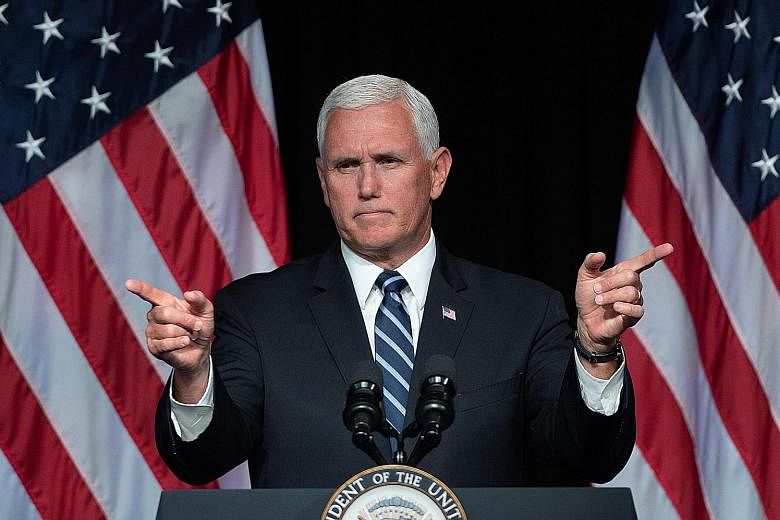WASHINGTON • US Vice-President Mike Pence has laid out an ambitious plan that would begin creating a military command dedicated to space and establish a "space force" as the sixth branch of the US military as soon as 2020, the first since the air force was formed shortly after World War II.
Mr Pence on Thursday warned of the advancements that potential adversaries were making and issued what amounted to a call to arms to preserve the military's dominance in space.
"Just as we've done in ages past, the United States will meet the emerging threats on this new battlefield," he said in a speech at the Pentagon. "The time has come to establish the United States Space Force."
But the monumental task of setting up a new military department, which would require approval by a Congress that shelved the idea last year, may require significant new spending and a reorganisation of the largest bureaucracy in the world. And the idea has already run into fierce opposition inside and outside the Pentagon, particularly from the air force, which could lose some of its responsibilities.
Defence Secretary James Mattis last year said he opposed a new military department "at a time when we are focused on reducing overhead and integrating joint war-fighting functions". This week, he said the Pentagon and the White House "are in complete alignment" on the need to view space as a war-fighting domain. But he stopped short of endorsing a full-fledged space force.
In a briefing with reporters after Mr Pence's speech, Deputy Defence Secretary Patrick Shanahan suggested that Mr Mattis' comments opposing the space force were made at a different time, before the Pentagon received a bolstered budget.
White House officials have been working with national security leaders to aggressively move ahead without Congress.
The first step is creating a new US space command by the end of the year which would be led by a four-star general, the way the Pentagon's Indo-Pacific Command oversees those regions.
The new command would pull space experts from across the armed services, and there would be a separate acquisitions office, dedicated to buying satellites and developing new technology to help the military win wars in space.
After the announcement on Thursday, President Donald Trump tweeted: "Space Force all the way!" For months, he has been calling for a space force, a new, free-standing military department, with its own chain of command and uniforms.
In a letter to supporters on Thursday, the Trump 2020 campaign said it would sell a line of gear that could come with a logo of their choosing - including one labelled "Mars Awaits" - to commemorate "President Trump's new Space Force", according to a copy of the e-mail - a move that fuelled criticism that the effort was motivated by politics.
The White House intends to work with lawmakers to introduce legislation by early next year, a senior administration official said.
Some members of Congress and military leaders have been warning that space is no longer a peaceful sanctuary, but a domain of conflict that needs more attention and resources.
Space is vital to the way the US wages war; the Pentagon's satellites are used for missile-defence warnings, guiding precision munitions, and providing communications and reconnaissance.
Russia and China have made significant advancements, challenging the US' assets in space.
In 2007, China blew up a dead weather satellite with a missile, creating a massive debris cloud in orbit, which Mr Pence called "a highly provocative demonstration of China's growing capability to militarise space". China also has demonstrated the ability to hit satellites in a much deeper orbit, where the military parks some of its most sensitive assets.
In his speech, Mr Pence acknowledged the difficulties in establishing a new service, and said the Pentagon would create an assistant secretary of defence for space, a top-level civilian who will report to the defence secretary "to oversee the growth and expansion of the sixth branch of service". The official must sort out many details, including how the Pentagon would recruit for the space force and compete for resources within the Pentagon.
Even basic details, such as what uniforms and what rank structure the space force would use, must be decided.
The White House has pushed for Congress to invest an additional US$8 billion (S$11 billion) in national security space systems over the next five years.
WASHINGTON POST

